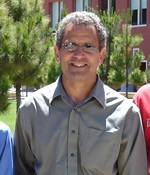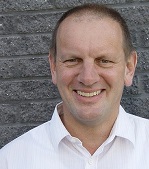Third Rock Ventures is taking the wraps off its latest biotech creation. This one is called Pliant Therapeutics, which has recently lined up an experienced biotech vet to take the helm as it sets sail on a more than two-year journey toward its first clinical data.
 |
| UCSF's Dean Sheppard |
To put it simply, Pliant will pursue the latest scientific advances on integrin inhibition from a group of investigators including Dean Sheppard, a scientist at UC San Francisco. Sheppard--who outlicensed some of his earlier antibody-related work on αvβ6 which was later spun out to Stromedix and then reacquired by Biogen ($BIIB)--has been focused more recently on the αvβ1 integrin in preventing a biologic cascade that leads to fibrosis, primarily by activating transforming growth factor beta 1 (TGFβ1).
The αvβ1 integrin is the first target at Pliant, Sheppard tells me, with more work on a broader approach to integrins as well as "downstream steps" related to TGFβ1. Pliant wants to more narrowly modulate the response to TGFβ1 without just "willy-nilly blocking it," which would likely spur toxicity, says the scientist, who's been toiling on fibrosis for 20 years. The group has already done a lot of work on their target, he adds, with more to be done on proving the best small molecules, which can initially be inhaled and then later taken orally.
"This has been a sweet spot for Big Pharma," says CEO Bernard Coulie about fibrosis, especially as the current meds on the market "don't really work."
An aggressive bunch of major league players has made fibrosis a priority. In addition to Biogen, which kept its Phase II antibody development work from Stromedix but recently jettisoned the research group it had in a big reorganization, Gilead ($GILD) has been busy and Bristol-Myers Squibb ($BMY) nabbed Promedior last year with a $1.25 billion deal.
If Biogen does succeed with its program, says Sheppard, that would actually help pave the way for Pliant's next step. And in the meantime, some key recent failures at Gilead (simtuzumab) and AstraZeneca has helped clear the experimental field a little.
 |
| Pliant CEO Bernard Coulie |
Coulie believes Pliant has an edge on the more advanced program at Biogen, which he says is limited to the lung (idiopathic pulmonary fibrosis) while Pliant can use a small molecule to go after fibrosis in the lung, liver and other targets. He's also not under any illusions regarding the timing. Pliant plans to get the IND in next year with an entry into the clinic in 2018.
There is plenty of money for that, though. Third Rock's foundation round is enough to get to the first data drop, when the company can see just how well this approach works. And in the meantime, there's plenty of time to follow up with the leaders in the field as the biotech explores the potential for deals along the way.
In many ways, Pliant is a classic Third Rock startup, with a twist. The venture group specializes in bringing together an expert group from a variety of institutions, but this time around they're starting with a scientific team that is based at UCSF. In addition to Sheppard there's Bill DeGrado, a close colleague for the past few years with a long track record of his own in integrin inhibition, along with Hal Chapman and Bradley Backes. Neil Exeter, a partner at Third Rock, helped take the lead on the company with Charles Homcy and Craig Muir.
Right now, the emphasis is on hiring. Pliant has 7 staffers and by the end of this year Coulie--who was co-founder and CEO of ActoGeniX when it was bought out by Intrexon in a $60 million deal a year ago--expects that figure to swell to 20.
That model suits Sheppard fine. This is the first time, he says, that he's founded a company. But it's less about the potential payoff than it is about seeing if a small, dedicated company like Pliant can take a project all the way.
"Partly, the decision to be involved comes from a little bit of frustration dealing with bigger companies' tendency to change their priorities on a dime," says Sheppard. Now he want to see the "idea pushed to the limit, to see if it's actually going to be useful."
- read the statement